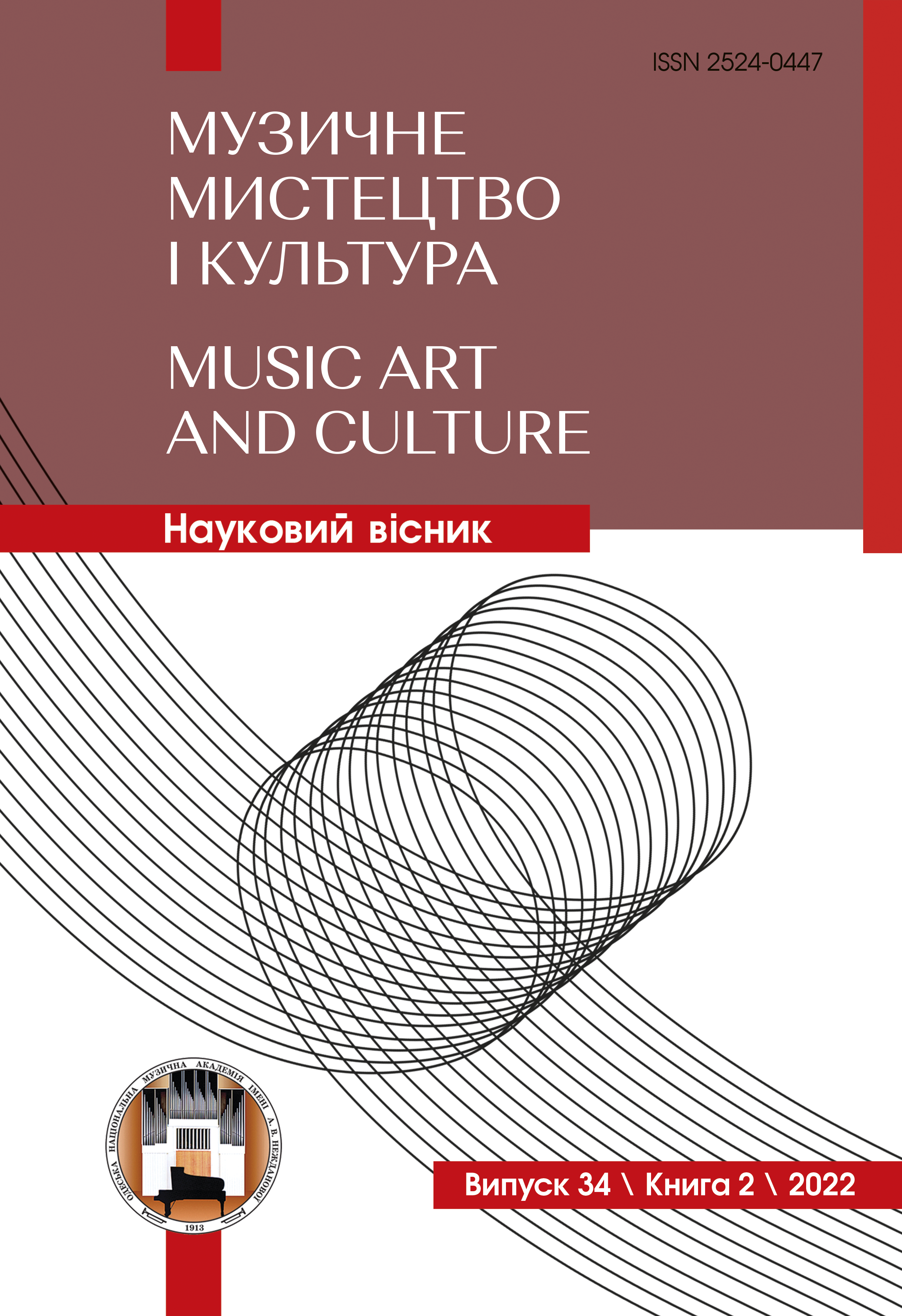ПРОБЛЕМА ХУДОЖНИКА І ВЛАДИ В ОПЕРІ «ПОРТРЕТ» М. ВАЙНБЕРГА (РЕЖИСЕРСЬКА ВЕРСІЯ Д. ПАУНТНІ)
Анотація
Мета роботи – дослідити особливості сценічного втілення опери М. Вайнберга «Портрет» режисером Д. Паунтні. Методологію дослідження складає історико-порівняльний, біографічний методи та текстологічний аналіз. Наукова новизна даної статті полягає в тому, що вперше в музикознавстві вивчається специфіка сценічного втілення опери М. Вайнберга «Портрет». Висновки. В «Портреті» Гоголь піднімає складні «питання філософії буття та мистецтва» [4]. Взагалі, портрет в історії мирового мистецтва є одним із найсуперечливіших жанрів. На портреті зображуються найбільш характерні індивідуальні риси людини: обличчя, міміка, жести, одяг, аксесуари та ін. Символічне значення портрета – відтворення самого себе як спосіб подолання швидкоплинності життя. «Портрет» М. Гоголя, за думкою В. Баля, є важливим явищем російського історико-літературного процесу певного періоду [4, с. 13]. Тема «живого» портрету пов’язана з питаннями, актуальними для того часу взагалі, зокрема, роздумами про природу реалізму, про проблему герою твору і роль художника в мистецтві та житті. Зображений на портреті лихвар – символ матеріального та бездуховного начал – спокушає художника грошима, провокує його відмовою від зростання майстерності та, відповідно, духовного зростання [4, с. 14]. Англійський театральний і оперний режисер Д. Паунтні із трьох актів опери Вайнберга зробив два, завдяки чому більша частина другої дії практично перетворилася в одну величезну сцену смерті головного героя. Взагалі, сценічне втілення Паунтні «Портрету» наближує гоголівське першоджерело до історичних та соціальних реалій ХХ століття, оголює вічність теми несвободи творця, який, обслуговуючи владу, марнує свій талант і, зрештою, переживаючи розпад особистості, гине.
Посилання
2. Арват Н. Синтаксические доминанты повести Гоголя «Портрет». Література та культура Полісся. Ніжин, 1992. Вип. 3. С. 94–110.
3. Бабурина Е., Макарова А. Современный оперный мир Мечислава Вайнберга. Дискуссия об операх композитора на форуме «Мечислав Вайнберг: возвращение». Музыкальное обозрение. № 4-5. 2018. URL: https://muzobozrenie.ru/sovremenny-j-operny-jmir- mechislava-vajnberga/.
4. Баль В. Мотив «живого портрета» в повести Н.В. Гоголя «Портрет»: Текст и контекст. Вестник Томского государственного университета. 2009. № 323. С. 13–15.
5. Белинский В. О русской повести и повестях г. Гоголя. URL: Lib.ru: ‘Классика’ /http://az.lib.ru/b/belinskij_w_g/text_0320.shtml.
6. Бобровский В. Эскиз портрета. В.П. Бобровский. Статьи. Исследования. Москва : Сов. композитор, 1990. С. 270–282.
7. Манн Ю. Николай Васильевич Гоголь. URL: http://az.lib.ru/g/ gogolx_n_w/text_0200.shtml.
8. Манн Ю. Н.В. Гоголь. Тайны биографии и тайны творчества. Москва : РГГУ, 2019. 143 с.
9. Муравьева И. Короткое замыкание. В Познани поставили оперу по повести Гоголя «Портрет». Российская газета. Федеральный выпуск. № 10(6282). URL: https://rg.ru/2014/01/20/portret.html.
10. Никитина Л. Моисей (Мечислав) Вайнберг. URL: http:// litbook.ru/article/15023/.
11. Райгородский П. Мечислав Вайнберг: жизнь, творчество, судьба. URL: https://muzobozrenie.ru/mechislav-vajnberg-zhizn-tvorchestvo-sudba/.
12. Самойленко Г. Микола Гоголь і Україна: енциклопедія. Ніжин : НДУ ім. М. Гоголя, 2020. 696 с.
13. Сазонова Л.И. Средневековый мотив богородичного чуда в повести Н.В. Гоголя «Портрет». Славяноведение. 2010. № 2. С. 79–89.
14. Сюй Цзыдун. Опера Го Вєньцзина «Деревня волчья» в аспекте мировой музыкальной гоголианы : дис. ... канд. мистецтв : 17.00.02. Санкт-Петербург, 2018. 214 с.
15. Тернова Т. Семиотика безумия в литературе русского аван- гарда. Вестник Челябинского государственного университета. Филология. Искусствоведение. 2010. Вып. 45. № 21(202). С. 134–139.
16. Тюменева Г. Гоголь и музыка. Москва : Музгиз, 1966. 215 с.
17. Уцелевший из Варшавы. 8 декабря 2019 года отмечается 100 лет со дня рождения выдающегося композитора Мечислава Вайнберга. URL: https://muzlifemagazine.ru/ucelevshiy-iz-varshavy/.
18. Marczyński J. Śpiewający Lem i czujne oczy Stalina. URL: https:// www.rp.pl/kultura/art12056731-spiewajacy-lem-i-czujne-oczy-stalina.
19. Szwarcman D. Portret prserysowany. URL: https://szwarcman. blog.polityka.pl/2014/01/18/portret-przerysowany/.
20. Zalas D. Sztuka zniewolona. ‘Portret’ Mieczysława Wajnberga w poznańskim Teatrze Wielkim. URL: http://meakultura.pl/artykul/sztukazniewolona- portret-mieczyslawa-wajnberga-w-poznanskim-teatrzewielkim- 790.




 Музичне мистецтво і культура
Музичне мистецтво і культура